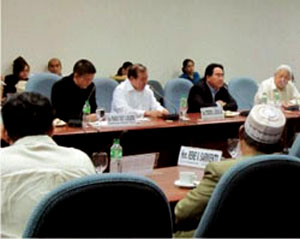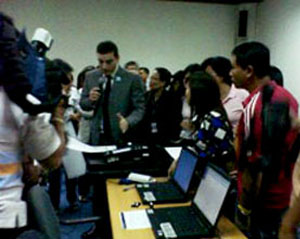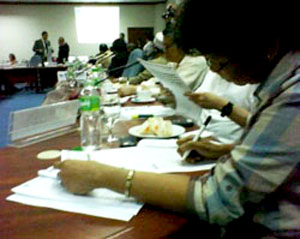Poll body asked to reply to CenPEG’s “30 vulnerabilities of the AES”
Lawmakers have asked the Commission on Elections (Comelec) to respond in writing to the 30 election concerns raised by the Center for People Empowerment in Governance (CenPEG).
Speaking before the Joint Congressional Oversight Committee (JCOC) on the Automated Elections last March 3, CenPEG Executive Director Evi-ta Jimenez said that “it is best for the Comelec to supply us a formal answer to all 30 points, and not just on the source code issue.”
The 30 concerns refer to the 30 vulnerabilities and 30 safeguards of the Automated Election System (AES) identified by CenPEG in a policy study June last year done in partnership with the College of Law of the University of the Philippines.
Jimenez added that CenPEG had already asked the poll body for a response since last year.
Rep. Teodoro Locsin, Jr., who co-chairs the JCOC, said in the hearing there are technical aspects in the 30 questions that Comelec should not ignore.
JCOC co-chair Sen. Francis “Chiz” Escudero also urged the Comelec to reply and for the Comelec Advisory Council (CAC) to “come up with answers independent of Comelec.”
Comelec Commissioner Gregorio Larrazabal said the poll body had responded to the 30 points but noted that CenPEG had apparently updated its queries. The commissioner said however they will look into the matter.
CenPEG issued a denial, adding that it has never received any reply to its questions.
Meanwhile, the Comelec is currently cleaning up double registrants in the “posted computerized voters' list” (or PCVL). A report released by Catholic Archbishop Oscar Cruz, lead convener of Kontra Daya, an anti-fraud group, showed the number of double registrants is about five million.
Escudero cited news reports saying that in Davao City and Davao del Sur alone, there are 40,000 multiple registrants based on the manual check done by volunteers from the Parish Pastoral Council for Responsible Voting (PPCRV).
Larrazabal clarified that Comelec will prepare a list of names of multiple registrants in each province that will be given to Boards Election Inspectors (BEIs). Those in the list will not be allowed to vote, he said.
In the same JCOC hearing, Escudero also pushed for the use of projectors at canvassing centers. He said that printed election returns (ER) are “useless” if these are not readable to poll watchers and other observers.
Responding, Cesar Flores, president of Smartmatic Asia Pacific, said that the use of projectors is a “democratic idea”. He gave assurances however that even without the use of projectors voters can still see the ERs “online.”
Escudero urged the Comelec to include the use of projectors in its official protocols. He also asked the poll body to conduct an inventory of local government units (LGUs) with projectors.
“If Comelec mandates it by mere resolution, it will be the job of every municipality to provide projectors,” the senator said.
He added that each projector to be used needs to be authenticated or certified to ensure that “it will beam exactly what appears in the computer.”
At the JCOC hearing, Smartmatic-TIM held a demonstration of a precinct count optical scan (PCOS) machine and a canvassing machine. Members of the panel and several senate staff participated in filling out and feeding the ballots into the PCOS machine. CenPEG News

The JCOC panel March 3 (L-R) Sen. Francis Escudero, Reps. Teodoro Locsin, Jr., Rufus Rodriguez, and Edcel Lagman. CenPEG photo

Cesar Flores, president of Smartmatic Asia Pacific, leads a demo for the JCOC panel and Senate staff. CenPEG photo

CenPEG Executive Director Evi-ta Jimenez, extreme right, fills in a sample ballot. CenPEG photo
- Probing presidential platforms
- Conference calls for people-centered policy actions for Asian development and peace
- WWII 'comfort women' urge visiting Japanese emperor: OFFICIAL GOV’T APOLOGY, UPHOLD TRUTH, and JUST COMPENSATION
- FEARLESS FORECAST (EPISODE II): Comelec will not comply with e-Commerce Law in 2016 elections
- Fearless forecast: Comelec’s non-compliance with the AES law in 2016 (last of 2 parts)
- Fearless forecast: Comelec will not comply with the AES law in 2016
- CenPEG releases travelogue
- Experts: Nuisance bets reflect disillusionment, uneven playing field
- Partylist solon presses for tax cuts
- The True Cost of a Political Campaign
- Management decisions: Based on RA 9369 or purely Comelec’s?
- CenPEG holds 1st roundtable with media on presidential poll results
- Filipino IT can do it!
- FIT4E: The only transparent solution
- Realpolitik in the maritime tiff
- China’s challenge to PH sovereignty
- Choosing the next president
- Fixing the presidency, reforming the state
- New Comelec chair says he’s open to other election technologies
- SC ruling on AES Watch Pabillo and IBP vs Comelec, Smartmatic-TIM
- Comelec must explain P3.2B unliquidated cash advances
- CONGRESS ASKED TO HOLD DEMO ON PCOS HACKING
- 25 Bishops ask poll body to stop midnight deal with Smartmatic
- Pope Francis: reform and conversion
- 2 poll watch coalitions stage rally vs Comelec-Smartmatic midnight deal
- AES Watch questions Comelec-Smartmatic midnight deal
- ASEAN-India: Building Youth Partnerships through Culture and Entrepreneurship
- CenPEG forges research exchange and partnership with Jinan University
- FOI: Bearing fruit or foiled again?
- Remittance with Representation: The right to vote of overseas Filipinos
Center for People Empowewrment in Governance (CenPEG), Philippines. All rights reserved


